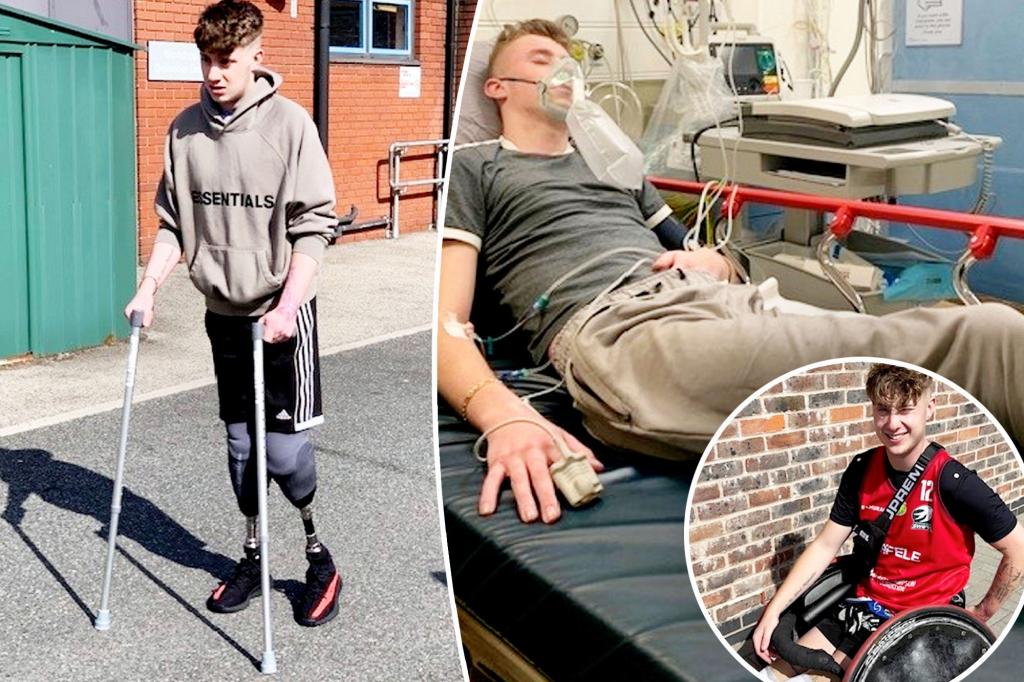A seemingly fit and healthy young man, Levi Dewey, faced a life-altering crisis just days before his 21st birthday when he was diagnosed with sepsis, a severe bodily response to infection. The ordeal began when the active 20-year-old developed flu-like symptoms and resorted to over-the-counter medications. However, his condition took a turn for the worse, prompting his mother, Lara, to seek medical help after sensing something was seriously wrong.
Upon arriving at the hospital, Levi quickly deteriorated, experiencing septic shock and multiple organ failure. His health crisis led to his transfer from Royal Derby Hospital to Leicester’s Glenfield Hospital, where doctors discovered he was suffering from pneumococcal pneumonia alongside sepsis. In a shocking turn of events, his parents, Lara and Neil, were informed that Levi would need surgery to amputate both legs below the knee—an operation he underwent just two days before his 21st birthday.
When Levi finally woke up, he was filled with gratitude for his survival but could hardly fathom the significant changes awaiting him. “I woke up and Christmas had passed; it was like my life was flipped upside down,” Levi shared. “I was relying on my family to tell me what had happened; it was such a blur.”
Adjusting to his new reality has proven to be a monumental challenge for Levi. He reflected on the difficulties he faced in the aftermath of the surgeries. “When I got home, it didn’t really feel like home because I was stuck living in my front room,” he explained. “I couldn’t get changed by myself or even sit up, and because I lost my feet, I had to relearn how to drive again with my hands. It’s those things people can’t really understand.” Despite his struggles, Levi expressed gratitude for the strong support from his family, recognizing that sepsis has irrevocably changed his life.
Lara and Neil first brought Levi to the hospital in December 2022, alarmed by his “quick and shallow” breathing. Lara commented, “I don’t know if it was mom’s intuition, but his breathing wasn’t right. He was dosed up on cold and flu tablets but had a high temperature that wouldn’t cool down, and he was really drowsy, with no appetite. He just wasn’t my Levi.”
Following his surgery, Levi underwent a critical procedure known as Extracorporeal Membrane Oxygenation (ECMO) at Glenfield Hospital. This advanced treatment involved circulating his blood through an artificial lung that adds oxygen and removes carbon dioxide before returning it to his body. Lara recounted, “It all happened so quickly. We were told to get home and rest, but then we got a phone call telling us we needed to get there quickly because he was deteriorating. We rushed to be with him, and that’s when they told us they didn’t know if he was going to make it through the night. He had a 30% chance of survival. It was horrific.”
As Levi’s family processed these traumatic events, they were alarmed to learn just how little they knew about sepsis. “We had no idea what sepsis was or how severe it could be,” Lara explained. “I thought it was something that only affected older people or that you got from a cut. When I saw him in the hospital, mottled and with blue legs, it was horrifying.”
Neil added, “Sepsis is actually quite common, but we didn’t know much about it before it affected Levi. What we learned is that sepsis affects younger people differently than older individuals. With older folks, their weaker immune systems reveal symptoms more clearly. Levi’s strong immune system masked his symptoms until it spiraled out of control.” He strongly urged others to be aware of the signs of sepsis.
Dr. Alina Paunescu, an emergency medicine consultant and sepsis clinical lead at University Hospitals of Derby and Burton NHS Foundation Trust, stated, “Sepsis can affect people of all ages, but infants and seniors are at greater risk due to less developed or compromised immune systems. Levi’s experience, although tragic, is not unique. Young patients may develop sepsis after contracting an aggressive virus or bacteria or receiving inappropriate treatment for initially minor ailments.” She emphasized the importance of recognizing the symptoms of sepsis, which can include:
- Confusion
- Extreme shivering or severe muscle pain
- Severe breathlessness
- Not passing urine within 18 hours or a day
- Blue, grey, pale, or blotchy skin, lips, or tongue
- Dizziness
Understanding sepsis and its potential consequences is vital to ensuring timely medical intervention and saving lives. Levi’s remarkable journey is a solemn reminder of the critical nature of health awareness and the unexpected challenges that can arise even for the healthiest individuals.






